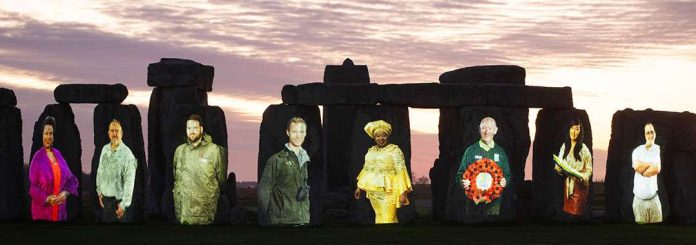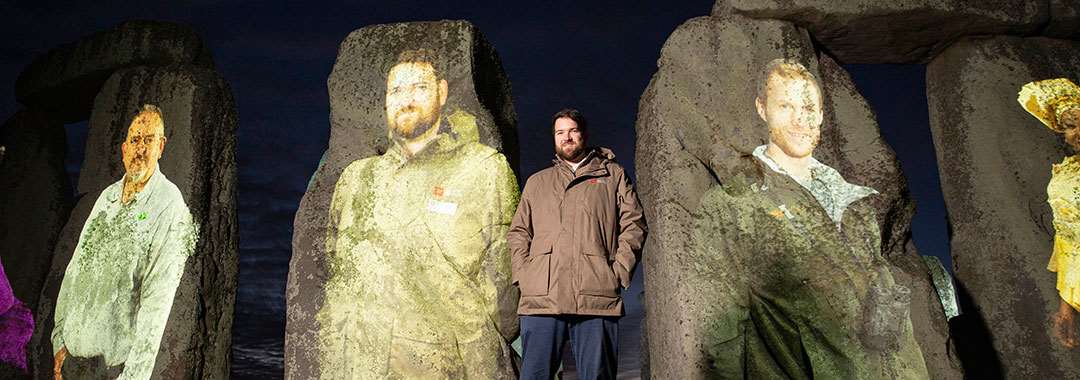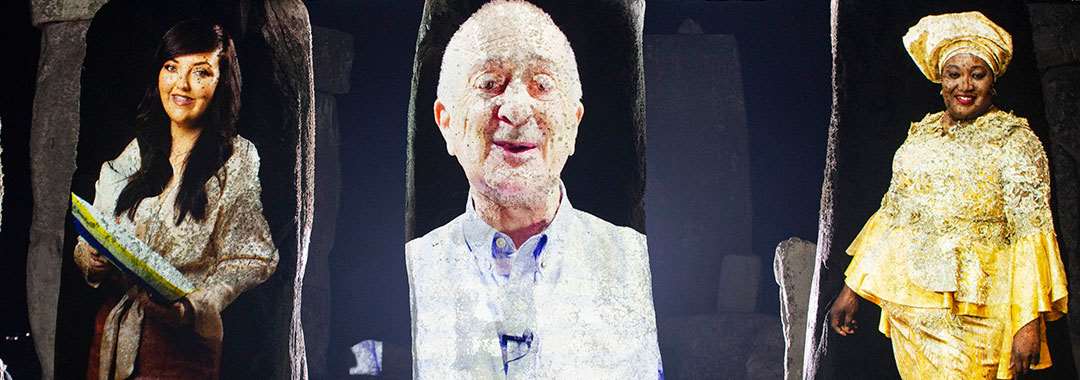Eight people were chosen to appear on the uprights of Stonehenge to thank them for the part they played in supporting arts and heritage during the coronavirus pandemic.
Stonehenge has been temporarily illuminated with images of ‘unsung heritage champions’ from across the UK, including one of its own staff members.
The historic takeover was unveiled by television personality Sir Tony Robinson. Prohibited from attending the display due to current restrictions, a video projection of Sir Tony acted to first illuminate the historic stones and introduce the display.
The night-time celebration, supported by National Lottery funding, used eight projectors to honour the individuals who have worked tirelessly to keep the UK’s heritage accessible during the pandemic.
English Heritage’s James Rodliff is Operations Manager at Stonehenge and oversees the day-to-day running of the site. He was one of the heritage workers honoured with the illumination.
Without any visitors to the iconic site, and with the majority of the Stonehenge staff on furlough, James worked with a small team throughout both lockdowns to ensure the care and conservation of the 5,000 year-old monument.
James, 35, was instrumental in planning for the re-opening of the site in early July, which received fantastic feedback from visitors, for the safe environment and warm welcome they received.
Stonehenge is just one of more than 400 sites cared for by English Heritage and almost all were able to re-open safely to the public following lockdown.
James Rodliff said:
‘I’m surprised and humbled by this recognition from The National Lottery. I certainly didn’t expect to turn up to work and see my face up in lights. English Heritage has worked exceptionally hard – at Stonehenge and the hundreds of historic sites in our care – to look after these inspiring places and to welcome people back safely to them.
‘Over the years, the National Lottery has helped to transform Stonehenge including grassing over a road that ran right through the site, removing the old visitor facilities beside the monument, and creating a new visitor centre that does justice to this wonder of the world.’
Also recognised are:
- Jade West, volunteer Co-ordinator at the Skylark IX Recovery Trust in West Dunbartonshire, Scotland. Jane has played a vital role in continuing the charity’s work to support the engagement, training and skills development of our addiction recovery service clients during this year’s Lockdown. The Skylark IX project is restoring a Dunkirk Little Ship, which rescued over 600 men during the Second World War.
- Luke Strachan, CEO of Wild Things, an environmental charity in north east Scotland. Luke has been behind the pioneering Silver Saplings project, which helps whole communities and vulnerable older people, including care home residents, to take part in nature-based activities in a bid to tackle isolation, loneliness and immobility.
- William Colvin, of Cushendun, Northern Ireland. William has worked to rescue a deconsecrated church, repurposing it as a community arts and heritage venue in an isolated village that is part of the Antrim Coast and Glens Area of Outstanding Natural Beauty.
- Uzo Iwobi OBE, founder of Race Council Cymru Wales. Despite the pandemic, Uzo led and delivered the first-ever Black History Wales 365 initiative. This was an ambitious year-long educational, heritage, cultural and celebratory programme of events that supported grassroots ethnic minority communities during the pandemic.
- Lee Turner, from Penllegare Trust, Wales. Lee works towards restoring a heritage woodland. He has worked throughout the pandemic to run the project, whilst also keeping the space open and safe for visitors during lockdown and beyond.
- Susan Pitter, from Jamaica Society, Leeds. The society Susan is a part of provides a voice and value to unheard and sometimes challenging stories of the Jamaican community in Leeds.
- Mick Byrne, from the National Memorial Arboretum, Staffordshire. Mick is one of the many volunteers who strives to provide a world-class visitor experience. The NMA is the UK’s year-round centre of remembrance. It’s freely open to all and set in 150 acres of beautiful parkland with around 25,000 trees and around 400 memorials all dedicated to service and sacrifice.
To find out more about how The National Lottery is celebrating the work done by unheralded people across the UK, visit their website.



